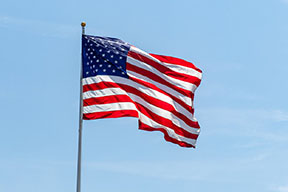Should ‘Under God’ be Stated in the Pledge?

American flag waving on pole with bright vibrant red white and blue colors, negative space
“Please rise for the Pledge of Allegiance. I pledge allegiance to the flag of the United States of America, and to the republic for which it stands, one nation, under god, indivisible, with liberty and justice for all. Please remain standing for a moment of silence.”
This was a morning routine that I had for years, the measured voice of the school principal over the loud speaker, the eerie synchronization of all the children in the building, then the deafening silence begging to be broken. Sometimes somebody would oblige and break that silence, only to be chastised by any teacher near you, also any teacher would get up in your face if you didn’t rise for the Pledge, say it, or omit words in it. People have protested forever, and in school when a child refuses to say something that goes against their beliefs, they are shot down.
The Pledge of Allegiance has been said in schools everyday for generations, our version since 1954 to be exact, and students have been forced to proclaim that we are “under God,” even if it goes against their beliefs. 1954 was when President Eisenhower decided to change the Pledge of Allegiance and add the words, “Under God.”
I believe the “Under God” should be removed from the pledge of allegiance.
One reason for removing “Under God” from the pledge is because it indoctrinates children into believing that we are under god, and he/she watches over us. According to the American Humanist Society, this version of the Pledge of Allegiance goes against the court’s analysis of coercion. While children technically have the option to opt out, usually they don’t due to wanting to fit in, or because the teacher tells them to be respectful and patriotic. The parents of said children also have little choice whether they want to send their children to school which indoctrinates some children against their parents’ wills.
The Pledge should be changed because this is not what the founding fathers would have supported.
The founding fathers wanted a godless and religion-less government. This shows in the fact that “In God we Trust” appeared on our money during the civil war, and “Under God” was put in the Pledge in 1954 by President Eisenhower due to “the McCarthy hysteria.” Furthermore. According to Brooke Allen, “Our Constitution makes no mention of God. The omission was too obvious to have been anything but deliberate. These mentions of God in our life and governance was not the will of the founders.
Some people may say that “Under God” should stay in the Pledge. They say this because it unites us, and it would be a hassle to change it. It says so in Eisenhower’s speech that kids will now proclaim their loyalty to the nation and to the “almighty,” and to maintain “the transcendence of religious faith in Americas heritage and future.” This was put in to combat communism, an oppressive and godless government and to show our unity. But now, as America is still a democracy, and communism is no longer viewed as the threat it was, what purpose does it serve now? Especially because religious faith is going down on its own.
The Pledge also needs to be changed because it goes against the Constitution. The First Amendment states that “Congress shall make no law respecting an establishment of religion, or prohibiting the free exercise thereof.” According to Stephen R. Reinhardt, having “Under God” in the Pledge is only there for religious purposes and making children in school say this version everyday violates the Lemon Test, and therefore the Establishment Clause. The Lemon test is a three-part test to see if a government action violates the First Amendment, making have the words “Under God” in the Pledge unconstitutional. In the Lemon test first the statute must have a secular legislative purpose; second, its principal or primary effect must be one that neither advances nor inhibits religion; finally, the statute must not foster an excessive government entanglement with religion.
Do you believe in God? It is a very simple question, but many misunderstand it. I am not asking if you are religious, or believe in a higher being, I ask if you believe in God, Capital G God, not any monotheistic religion. When this question was asked to eighth graders at Bedford Middle School, 47.1 percent answered with a yes. So in school when these children are forced to say our Pledge, only 47.1 percent fully believe what they are saying, do you want the children of America to proclaim words that they do not believe. Do you want kids lying everyday just because it’s been standard protocol since 1954?


